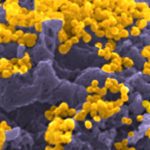Link to Pubmed [PMID] – 22045557
Cell. Mol. Life Sci. 2012 May;69(9):1435-45
B cells express immunoglobulins on their surface where they serve as antigen receptors. When secreted as antibodies, the same molecules are key elements of the humoral immune response against pathogens such as viruses. Although most antibodies are restricted to binding a specific antigen, some are polyreactive and have the ability to bind to several different ligands, usually with low affinity. Highly polyreactive antibodies are removed from the repertoire during B-cell development by physiologic tolerance mechanisms including deletion and receptor editing. However, a low level of antibody polyreactivity is tolerated and can confer additional binding properties to pathogen-specific antibodies. For example, high-affinity human antibodies to HIV are frequently polyreactive. Here we review the evidence suggesting that in the case of some pathogens like HIV, polyreactivity may confer a selective advantage to pathogen-specific antibodies.

